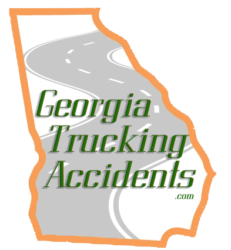Georgia Transportation Safety Rules Overview
The rules governing large truck safety are an essential guide which Montlick & Associates Georgia truck crash attorneys consult when pursuing a claim for victims of a truck accident. Commercial truck drivers must follow these rules; their failure to do so may result in a horrific crash that takes the life of an innocent victim or causes severe, long-lasting injuries. Truck crash victims should be familiar with these rules simply because having an understanding of a truck driver’s obligation may assist them with their claim. Additionally, Montlick & Associates truck crash attorneys believe that their clients should be well informed about all aspects of their case and not merely the progress of settlement negotiations.
Georgia issued regulations designed to govern over large trucks which are in operation on Georgia’s roads. These regulations are not exclusive of any federal regulations. Rather, the state regulations complement the federal regulations and make a cohesive regulatory scheme.
At the outset, Georgia’s regulations establish the minimum requirements governing the operation of a big rig on Georgia’s highways and roads. The regulations mandate that they trucks must be in good repair, and all safety equipment including brakes, lights, and other equipment must be in good working order at all times. The minimum requirements of a person eligible, according to the regulations are that the individual is a minimum of18 years of age, be of good moral character, be of temperate habits, and be competent to drive the truck. The minimum requirements mandate that the driver shall not consume drugs or alcohol while driving a large truck. Significantly, the state regulations essentially adopted the federal regulations in their entirety for continuity of safety requirements.
Georgia’s Department of Driver Services issues drivers licenses for the state. That entity also issues a publication designed to explain the state and federal regulations that make it easier for drivers to recall and understand what they need to do in a given situation in addition to establishing performance standards.
The federal regulations governing large truck operation in the United States were issued by the Federal Motor Carrier Safety Administration (FMCSA). The FMCSA regulatory scheme is a comprehensive series of regulations that touch upon every aspect of the operation, maintenance, and securing of loads. The FMCSA has the authority only over those trucks that travel in interstate commerce or are carrying goods in interstate commerce. There is a limited exception for drivers of certain trucks that are usually farm trucks that travel limited distances.
Every regulation is necessary every though the entire regulatory scheme might seem onerous. The rules have been issued after experts studied the need for the rule and the manner in which the new rule would affect driving. Drivers cannot select which rules they should follow and the regulations that they do not wish to follow. A driver’s failure to follow the rules will endanger everyone else on the road but could subject the driver to fines, surcharges, as well as suspension or revocation of his or her Commercial Driver’s License (CDL).
From the perspective of a victim of a truck crash, there are some federal regulations with which they should be familiar. For example, the regulations governing hours on duty are very important considering every truck crash must be investigated from whether the driver was fatigued. Also, safety checks and cargo securement regulations are very important to their claims.
Put Our Law Firm’s Over 33 Years Of Legal Experience To Work For Your Case!
The time you have to legally receive compensation is limited.
Sources: Cited within.

